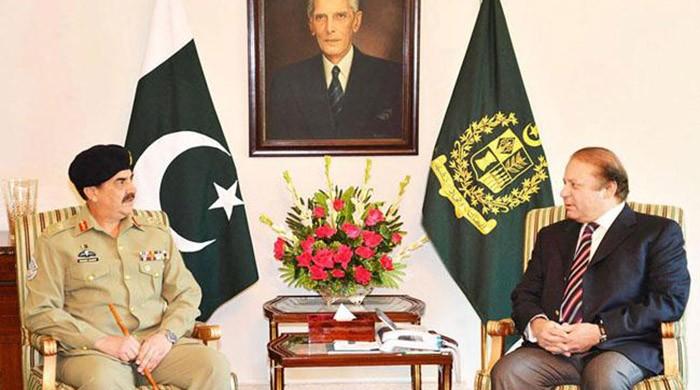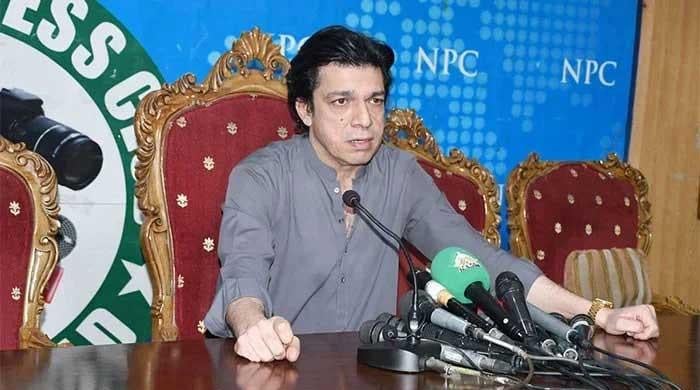How does PM Nawaz select his army chief?
ISLAMABAD: When it comes on the most sensitive appointment of new Chief of Army Staff , Nawaz Sharif the third time Prime Minister of the country has learnt to keep his cards close to his chest...
November 22, 2016

ISLAMABAD: When it comes on the most sensitive appointment of new Chief of Army Staff (COAS), Nawaz Sharif the third time Prime Minister of the country has learnt to keep his cards close to his chest until the final moment. It seems from the last nearly three and a half decades in politics the prime minister has taken this as lesson no. 1.
“We have given all the input but Prime Minister Nawaz Sharif has yet not shown his tilt towards any candidate for the slot however this is clear that he would announce the new name at the last minute,” a close aide of the prime minister revealed to Geo News.
The capital is abuzz and anxiously waiting for the selection of new Chief of Army Staff. The who's who in power palaces are either playing the guessing game while others are silently campaigning for their favorites.
Due to the country's weak democratic history and long uninterrupted tenures of four military dictators, this slot has become very important particularly because of the civil military imbalance in the country. Prime Minister Nawaz Sharif silently but with very tiny steps is trying to turn the pendulum of civil military relations in favor of the civilians.
The most circulated question in the power corridors is about who would be the new COAS? Whereas this is actually linked to the question, how PM Nawaz Sharif selects his COAS, as he has become the person who has worked with 8 out of the total 15 different army chiefs ,starting from General Zia down to Gen Raheel Sharif.
Out of the 15, General Pervez Musharraf, Gen Zia Ud Din Khawaja (was appointed by the PM but later was court expelled from the Army) and General Raheel Sharif were directly appointed by him. In the appointment of two COAS Gen Asif Nawaz and Gen Abdul Waheed Kakar , Nawaz Sharif played a key but a limited role due to the powerful President Ishaq Khan at that time.
“In case of my appointment, it was all sudden. I had requested for a retirement as I wanted to join Fauji Fertilizer Company (FFC) which was laying vacant.I did not know that PM would appoint me. In my case I guess it was a sudden decision and I guess only Lt-Gen Iftikhar Hussain the then secretary defense and Saeed Mehdi the principle secretary of the PM was consulted by the PM,” recalls ex-Gen Zia ud Din Khawaja while talking to this correspondent. Gen Zia ud Din following the military coup of 1999 was expelled from the military on administration grounds under Pakistan Army Act. He approached higher courts and is still waiting for the justice.
So it is established that the prime minister does take advice, but from only few whom he trusts.
At yet PM has selected generals with or without family backgrounds but in each case, experience was not as sweet as was calculated.
Does the PM listen to his spy chiefs? In case of General Raheel Sharif’s appointment which PM announced on November 27th at the last minute giving surprise even to General Kayani the then Chief of Army Staff, who had not recommended the officer nor even guessed.
At the time of the last appointment, everyone was guessing between Lt. General Haroon the senior most and Lt. General Rashid. Few would know that not only then Army Chief Ashfaq Pervez Kayani but also Lt. General Zaheer ul Islam the then chief of the powerful spy agency Inter-Services Interligence (ISI) had also recommended General Rashid, sources claim.
The prime minister at that point in time was advised to appoint Lt. General Tariq Khan by Aftab Sultan chief of the Intelliegence Bureau (IB) who later thwarted the 2014 Dharna (sit in) through his timely intelligence reports. Sources claim that the IB was recommending Lt. General Tariq because he was hard against militants and according to the civilian intelligence agency he could have been the best choice for fighting militants.
Lets not forget Musharraf whom the intelligence had not cleared but the prime minister selected him reportedly on the recommendation of Chaudhry Nisar Ali Khan the then petroleum minister in 1999 whose brother Lt. General Iftikhar was the defense secretary at that point of time.
Going by history it seems the prime minister does not necessarily listen to his spy chiefs, but their recommendations matter and they will matter this time as well as their reports are sent for the eyes of the Prime Minister.
This time Chaudhry Nisar Ali Khan as the interior minister is again in the circle of trusted cabinet members apparently because of thwarting the plan to lock-down Islamabad. He is probably the only strong bridge between the civilian government and the military. He is undoubtedly a secret man of Nawaz Sharif’s cabinet.
“Process of such appointments in the world are very sensitive I cannot discuss this with you or media,” said Chaudhry Nisar Ali Khan when asked about the way PM appoints CAOS.
Who else gave an input in 2013? A key source claims that the input was taken from Ishaq Dar the finance minister and “Sialkoti Munda” Khawaja Asif the defense minister.
This time, exactly like 2013, no one even from the palace of power is sure about the choice of Prime Minister for the said slot.
Close aides claim that there is a consultative group within the government which includes few important party leaders. Among them are senator Raja Zafar ul Haq PML-N Chairman, Ishaq Dar Finance Minister, Chaudhry Nisar Ali Khan Interior Minister, Khawaja Asif Defense Minister, Khawaja Saad Rafiq Railways Minister, Ahsan Iqbal the Minister for Planning and Development, Pervez Rashid former Information Minister, Senator Mushahid Ullah Khan to name a few.
In case of the selection of the President Mamnoon Hussain for his current post, the same group was consulted but this group was not consulted for the appointment of COAS.
“Yes I recall PM did not seek advice in this group for the appointment of COAS Raheel Sharif,” recalls senator Mushahid Ullah Khan an ex-minister of PM Nawaz Sharif’s cabinet. However he adds that PM has his own independent thinking regarding this.
An important thing is this that the prime minister does not like to be approached for this slot. Lt. General Haroon is yet another example who was superseded for two reasons a) he was using his contacts to approach the prime minister and b) he was one of the players of the October 12,1999 coup. Besides these two reasons Gen Kayani had also not forwarded his case with a good introduction.
The close sources to the prime minister claim that last time Prime Minister Nawaz Sharif did consult his wife Kalsoom Nawaz who is not on the forefront any more. Probably PM regards her because of her valor which she showed when her husband was sent to jail in 1999. The sources claim that key advice in appointment of army chief was given by Kalsoom who knew the family of the incumbent chief.
In the current game, sources say that prime minister may change the dynamics of chairman Joint Chiefs of Staff committee office in a surprise move.
The sources claim that one general in the run would also be overlooked. There is chance with the four generals who are professionally very strong but one out of them has an edge of being the class fellow of one of the key staffers of the Prime Minister. Incidentally all in the run are friends.
Some sections in the country criticize the late announcement of the new chief, “The Prime Minister should select the best of the best senior generals for the chief's position. He has a good range to select from, including a number who have fought against insurgents and terrorists and held senior staff positions. Professional soldiers do not think about politics. This should be the insurance the prime minister needs in making his choice. By delaying the announcement, the prime minister has unnecessarily created public debate and discussion. He can make amends by selecting a chief who will continue the Battle for Pakistan against extremism and radicalism,” says Shuja Nawaz author of , “Cross Swords,” one of the best books on Pakistan Army.









